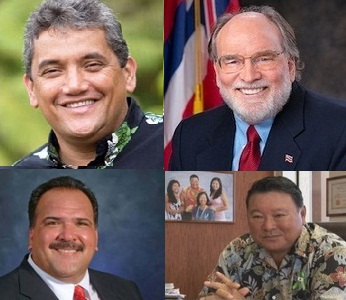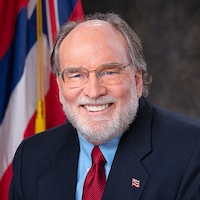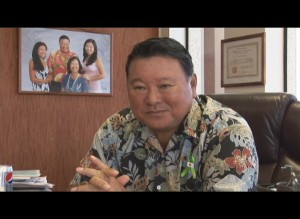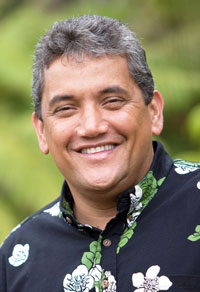ANALYSIS: Governor & Mayors – Where the Money Comes From

From top left, clockwise: Big Island Mayor Billy Kenoi, Governor Neil Abercrombie, Maui Mayor Alan Arakawa, Kauai Mayor Bernard Carvalho. Maui Now image.
By Nate Gaddis
Thanks to the state’s recently released interactive campaign spending tracker, we’ve been examining a wide range of financial data on Hawai`i politicians.
We’ve broken down the sources of top-level donations for the campaigns of political chief executives at both the state and county level.
The ‘Housewives’ of Gov. Abercrombie
It’s no surprise that most of the largest checks cut to Gov. Neil Abercrombie between 2010 and 2014 (the most recent reporting period that included an election) came from the county that hosts our state capital.
But regardless of Oahu’s position as a focal point for statewide politics, the near-total lack of top-level donations from the outer islands still remains striking.
Of the 195 maximum allowable contributions ($6,000) made to Abercrombie during the 2010-2014 campaign period, not a single one was made by a Hawai`i individual outside of Honolulu County.
However, Maui donors came to close to the maximum allowable, with two donations of $5,000. One came from an engineer in Wailuku, the other from an occupational therapist in Haiku.
Royal Hawaiian Orchards, Hawai`i Petroleum, and the “Friends of Dwight Takamine” — all Hilo-based entities — contributed $6,000 each to Abercrombie.
Interestingly, 16 of Abercrombie’s $6,000 contributions came from Oahu residents who listed their professions as “housewife” or “homemaker.” The governor appears to command that important demographic unlike any other political chief executive in Hawai`i.
Mayor Alan Arakawa – Maui Built?
Maui mayor Alan Arakawa raised a total of $514,492 in reported contributions (those over $100) during his most recent reporting period (2010-2014).
In contrast to the governor’s impressive check average, the majority (55%) of Arakawa’s campaign contributions were under $1,000.
A total of 24 individuals and entities contributed the maximum-allowable $4,000 to Arakawa, 14 of whom call Maui County home.
Of those 14 Maui-based donors, two were corporate entities. Global Financial Consultants and Del Rio Construction both gave $4,000 each to Arakawa.
Geographically, Arakawa’s single largest source of funding was Wailuku, Maui, where he was able to raise $117,144. That was followed by Kahului ($70,009) and Kihei ($60,856).
Collectively, Oahu-based donors contributed less than $115,000 to Maui’s mayor, making up just under 22% of his total support.
Mayor Billy Kenoi – FBI?
While Kalapana-born William Kenoi can boast of being 100% “FBI” (From the Big Island), we can’t say the same for his top-level political contributors.
Of the $624,000 in reported donations (greater than $100) Kenoi received during his most recent reporting period (2008-2012), at least $250,000 came from Oahu-based individuals and organizations.
While Kenoi didn’t have nearly as many large-dollar donors as Abercrombie (53% of contributions to Kenoi were greater than $1,000, compared to Abercrombie’s 83%), the vast majority (32) of his top-level contributors called Oahu home.
Of the 37 highest contributions made to Kenoi ($4,000 each), only five came from the Big Island. Four of those were made by individuals, while a single Big Island business entity (Hu Honua Bioenergy LLC) chose to donate the maximum amount allowed by law.
Not that Kenoi lacked local support.
The largest single source of Kenoi’s contributions overall (including all dollar amounts over $100) was actually East Hawai`i, with more than $100,000 received from individuals and entities in the Hilo area. Kona by contrast was the source of around $42,000 in funding, while approximately $19,000 came from the Waimea area.
In total, Oahu donors contributed just under $275,000 to Kenoi, making up approximately 44% of his overall support.
Mayor Bernard Carvalho – Not Exactly “Big Money”
Of the $168,951 in reported contributions Kauai’s mayor received between 2010 and 2014, the majority (54%) were greater than $1,000.
Apart from raising the least amount of money among his peers, Bernard Carvalho also had the lowest number of top-level donors.
Of the eight maximum-level contributions that Carvalho received (at $4,000 each), four came from within Kauai County, while three came from Oahu, and one came from California.
By far, the town of Lihue made up the largest proportion of donations to Carvalho’s campaign ($29,630), followed by Kapa`a ($20,746.23).
Downtown Honolulu was the third largest source of contributors (by zip code), bringing in $11,850.
In total, Oahu donors gave Carvalho approximately $44,000, making up just over 25% of his total contributions.











